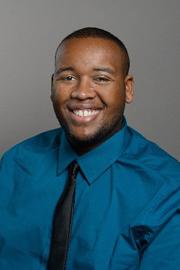
Working his second year as the graduate assistant at the LGBTQ Resource Center and finishing up his time as a grad student, Jeff Perkins uses his voice to help students who share his struggles from years ago.
Perkins realized the need for LGBTQ and marginalized identity representation on campus after seeing the lack of representation for queer and black students in the literature and assignments he was given as an undergraduate at MU. During that time, he spent time at the Resource Center and with other organizations that strive to make students feel welcome, such as the United Ambassador Student Recruitment Team, where Perkins was co-chair.
“We talked to prospective students of color that were considering Mizzou and we talked about what life is like as a person of color here, where do you find resources and community,” Perkins said.
As a young boy, Perkins grew up with the support of a single-parent household. While he went to public school every day in Kansas City, his mom returned to college to get her bachelor’s and master’s degrees.
“Growing up in Kansas City but also growing up being black and queer and in a low-income, predominantly black community, I saw the sacrifices my mom had to make to ensure that I had what I needed,” Perkins said. “I remember going to class with my mom in the evenings when she had to go to class.”
Following in his mother’s footsteps, Perkins has invested his time in a career that focuses on helping other queer and trans students find their niche in a college community, a place that’s often daunting to those navigating identity.
“My childhood was one where my mom encouraged me not only to take an investment in my education, but also take an investment in being supportive and being a helpful person to others,” he said. “I think that really influenced my beliefs and values.”
However, with a bachelor’s degree in English, it wasn’t always Perkins’ dream to become a college advisor. After working for College Access in a program called Missouri College Advising Corps, Perkins found his calling.
“That’s when I realized that I really liked working with students; I really like doing this,” he said. “I work in a space that was so dear to me as an undergrad but I’m on the other side now.”
Mark Boyd, a fifth-year undergraduate student at MU and president of the Triangle Coalition, believes that because of Jeff’s influence on his character, he has become a better student and a stronger advocate for the LGBTQ community.
“Honestly, he has helped me get really organized, and it goes beyond just me finding out about my sexual orientation and my gender identity and expression,” Boyd said. “Last year when I first met him, I had zero confidence in myself, so I didn’t really know what I was doing. It took him to really make a path for me to really understand that.”
Throughout his undergraduate career, Perkins became familiar with the people who he went to for support. Now, he is working alongside some of the people he called his mentors when he first stepped foot on campus in 2009.
“I try to foster a sense of belonging for students, especially queer and trans students of color attending predominantly white institutions because that’s something that I struggled to find,” he said. “The people who were my mentors are now my colleagues in the field, and that’s amazing that it’s come full circle.”
One of those mentors, Sean Olmstead, is the coordinator of the Resource Center, who hired Perkins.
“[Perkins] understands what it’s like to be a member of the LGBTQ community at Mizzou, so to be someone who serves the LGBTQ community, he’s well equipped because he understands what it’s like,” Olmstead said. “That knowledge really gives him the ability to better understand how we serve students.”
Perkins hopes to use his position to make changes before he leaves. With the preexisting Safe Space Training Program, where the Resource Center teaches other organizations how to be more welcoming towards LGBTQ and minority students, Perkins currently demonstrates the idea of representation of the LGBTQ community and marginalized identities that is needed in the classroom during these training sessions.
“I think that I’ve realized that there can be a collective frustration for marginalized students within higher education that is felt nationwide,” he said. “I think, given the recent history of Mizzou, people think that a lot of the problems are only isolated here, when it’s actually an overarching higher education issue that needs to be addressed.”
With his position as the graduate assistant, Perkins can use his voice as an outlet for his and other students’ identities through the Safe Space Training Program.
“I definitely make it a point to highlight the importance of understanding that thinking about LGBTQ inclusion is thinking about intersectionality, is thinking about how people’s identities influence their experience,” Perkins said. “Everybody who is LGBTQ is not living the same. I make a point to talk about is language and how you refer to the community.”
Although he may be ending his time as the graduate assistant for the LGBTQ Resource Center and saying goodbye to the University of Missouri, his work as an undergraduate and graduate student will not be forgotten. Perkins has learned things himself from working with the students that visit the Resource Center.
“I know that the things I struggled with as an undergrad and even as a grad student, knowing that other people are experiencing that is super important because not only does it help me understand and be able to help other people navigate the challenges, it also helps us find a collective solution, too,” Perkins said. “It also helps us to find that stronger sense of community through that.”
_Edited by Brooke Collier | [email protected]_